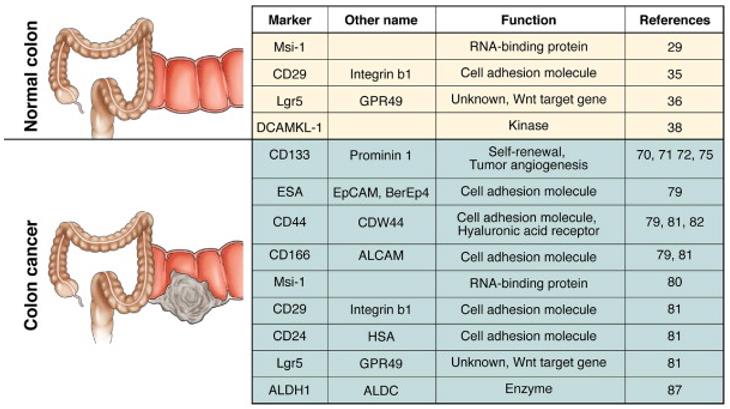Colon Cancer Stem Cell Markers
Related Symbol Search List
Immunology Background
Overview of Colon Cancer Stem Cell Markers
Colon cancer stem cell markers are specific molecular markers expressed in colorectal tumors and are a unique class of cell surface markers. Colorectal cancer stem cells are considered to be key factors contributing to tumor growth, recurrence, and drug tolerance. Therefore, studying these stem cell markers is important for the treatment and prevention of colorectal cancer. Currently, researchers have made significant progress in the study of colon cancer stem cell markers. By using techniques such as molecular biology and immunocytochemistry, a series of markers related to colon cancer stem cells have been identified, such as CD133, CD44, and CD166 (as shown in Figure 1). These markers can be used not only to identify the presence of colon cancer stem cells, but also as indicators for assessing tumor grade, prognosis, and predicting efficacy. In addition, researchers have explored the signaling pathways associated with these markers in order to develop targeted therapies.
 Fig.1 List of colon stem cell and cancer stem cell markers (Todaro M, et al., 2010)
Fig.1 List of colon stem cell and cancer stem cell markers (Todaro M, et al., 2010)
Research Areas of Colon Cancer Stem Cell Markers
The study of colon cancer stem cell markers covers a wide range of areas. When explored in depth, researchers have focused on the following areas:
- First, many studies have been devoted to identifying and validating stem cell markers in colon cancer stem cells. Through the analysis of tumor specimens and the establishment of cell lines, researchers are able to determine which markers are associated with tumor progression and prognosis, and further reveal their role in tumor stem cell function.
- Second, researchers are also trying to understand the mechanisms of colon cancer stem cell markers in tumor development. These markers are closely related to the regulation of signaling pathways such as Wnt, Notch, and Hedgehog. By studying the activation mechanisms and interactions of these signaling pathways, we can gain insight into the mechanisms of self-renewal and proliferation of colon cancer stem cells.
- In addition, researchers are exploring the possibility of adopting colon cancer stem cell markers as therapeutic targets. Since these markers are highly expressed and critically functional in colon cancer, it is expected that therapeutic strategies targeting these markers will inhibit tumor growth and spread. For those patients with drug resistance, therapies specifically targeting tumor stem cells may be an effective treatment option to improve their outcome and survival.
The study of colon cancer stem cell markers holds great potential and promise. Identification and understanding of these markers can provide new ideas for early diagnosis and treatment options for colorectal cancer. Further understanding of their functions and mechanisms could also facilitate the development of new drugs and the development of therapeutic approaches targeting stem cells. It will enable a better fight against colorectal cancer in the future, bringing better outcomes and chances of survival to patients.
Reference:
- Todaro M, Francipane M G, Medema J P, et al. Colon cancer stem cells: promise of targeted therapy[J]. Gastroenterology, 2010, 138(6): 2151-2162.

